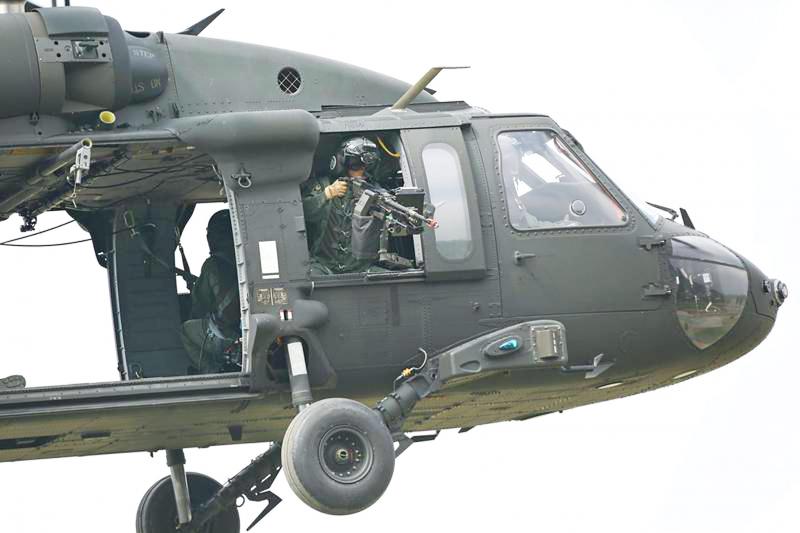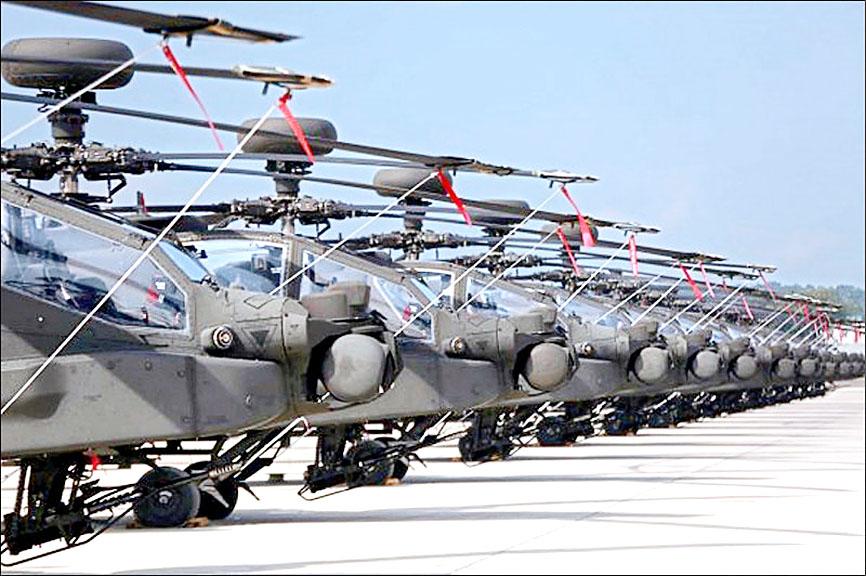The army is today to begin live-fire exercises in Pingtung County using all of its helicopter models to test its combat readiness, a military source said yesterday.
The Aviation and Special Forces Command is to conduct the annual “Mighty Eagle” exercises until Wednesday at Jiupeng Base in Manjhou Township (滿州), the source said.
All of the army’s helicopter series are to participate in the exercises, the source said, listing the AH-64E Apache and AH-1W SuperCobra attack helicopters, the OH-58D Kiowa Warrior reconnaissance helicopter, the CH-47 Chinook heavy-lift helicopter and the UH-1H Iroquois utility helicopter.

Photo: screengrab from ROC Army Facebook
During the daytime portion of the drills, the helicopters are to fire cannons, as well as Hellfire and Stinger missiles, at targets at sea and in the air, while at night, the Apaches would fire Hellfire missiles at targets, the source said.
Mighty Eagle is the command’s major helicopter drill, which is usually held in the second half of the year to test the aircraft’s capabilities with precision weapons systems.
Separately, a military source on Saturday said that two Sikorsky UH-60M Black Hawk helicopters from the air force’s Air Rescue Group conducted live-fire drills in Penghu County on Monday and Tuesday last week.

Photo courtesy of the Military News Agency
The exercises involving the Black Hawks, which were armed with M240 machine guns, were the first such drills since the Air Rescue Group was formed in 1950, the military official said.
Although the group is primarily tasked with noncombat missions, the live-fire drills were intended to simulate a wartime rescue mission conducted under enemy fire, the official said.
No further details were given and the air force declined to comment.
The Air Rescue Group operates 14 UH-60M helicopters. The Ministry of the Interior’s National Airborne Service Corps also has 14 of the models, while the army has 30.

INVESTIGATION: The case is the latest instance of a DPP figure being implicated in an espionage network accused of allegedly leaking information to Chinese intelligence Democratic Progressive Party (DPP) member Ho Jen-chieh (何仁傑) was detained and held incommunicado yesterday on suspicion of spying for China during his tenure as assistant to then-minister of foreign affairs Joseph Wu (吳釗燮). The Taipei District Prosecutors’ Office said Ho was implicated during its investigation into alleged spying activities by former Presidential Office consultant Wu Shang-yu (吳尚雨). Prosecutors said there is reason to believe Ho breached the National Security Act (國家安全法) by leaking classified Ministry of Foreign Affairs information to Chinese intelligence. Following interrogation, prosecutors petitioned the Taipei District Court to detain Ho, citing concerns over potential collusion or tampering of evidence. The

‘FORM OF PROTEST’: The German Institute Taipei said it was ‘shocked’ to see Nazi symbolism used in connection with political aims as it condemned the incident Sung Chien-liang (宋建樑), who led efforts to recall Democratic Progressive Party (DPP) Legislator Lee Kun-cheng (李坤城), was released on bail of NT$80,000 yesterday amid an outcry over a Nazi armband he wore to questioning the night before. Sung arrived at the New Taipei City District Prosecutors’ Office for questioning in a recall petition forgery case on Tuesday night wearing a red armband bearing a swastika, carrying a copy of Adolf Hitler’s Mein Kampf and giving a Nazi salute. Sung left the building at 1:15am without the armband and apparently covering the book with a coat. This is a serious international scandal and Chinese

Seventy percent of middle and elementary schools now conduct English classes entirely in English, the Ministry of Education said, as it encourages schools nationwide to adopt this practice Minister of Education (MOE) Cheng Ying-yao (鄭英耀) is scheduled to present a report on the government’s bilingual education policy to the Legislative Yuan’s Education and Culture Committee today. The report would outline strategies aimed at expanding access to education, reducing regional disparities and improving talent cultivation. Implementation of bilingual education policies has varied across local governments, occasionally drawing public criticism. For example, some schools have required teachers of non-English subjects to pass English proficiency

TRADE: The premier pledged safeguards on ‘Made in Taiwan’ labeling, anti-dumping measures and stricter export controls to strengthen its position in trade talks Products labeled “made in Taiwan” must be genuinely made in Taiwan, Premier Cho Jung-tai (卓榮泰) said yesterday, vowing to enforce strict safeguards against “origin laundering” and initiate anti-dumping investigations to prevent China dumping its products in Taiwan. Cho made the remarks in a discussion session with representatives from industries in Kaohsiung. In response to the US government’s recent announcement of “reciprocal” tariffs on its trading partners, President William Lai (賴清德) and Cho last week began a series of consultations with industry leaders nationwide to gather feedback and address concerns. Taiwanese and US officials held a videoconference on Friday evening to discuss the